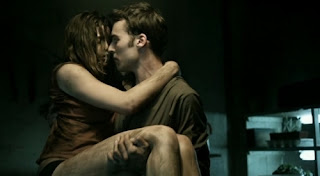I don't know about you, but I'm one of
those people who absolutely loves film trailers. Sometimes the highlight of going to the
movies is the previews alone. Therefore, I have seen some very good
trailers (1998's American History X comes to mind). But I have also seen some downright horrible ones (Kill Me Later, a film I have covered earlier on this blog and clearly love). Think about it and I'm sure you can
come up with some pretty atrocious "first looks."
Trailers that don't relate to the film
itself at all? Trailers for comedies that include every
funny bit from the film? Trailers that give away something crucial?
I'm sure there are hundreds if not
thousands of bad ones out there, but the worst one that jumps to my mind is the preview for Craig Brewer's 2006 film Black Snake Moan. I
don't think I have been so angered or frustrated by a film's
marketing in my life. And I am not talking about merely the trailer. It was the entire marketing scheme as a
whole.
Christina
Ricci herself, the film's female lead, has stated that the film's
marketing campaign was
“one
of the most disappointing and upsetting things that's ever happened
to [her] in [her] career.”
And
it's no wonder why.
When
my friend and I first saw the original theatrical poster for Black
Snake Moan, pictured below, we
honestly thought it was for some kind of soft-core porn-esque film.
 |
| Photo credit: Wikipedia |
Unfortunately, the trailer only furthered that thought.
After
seeing that, I thought this was a quirky, funny little movie about an
old black man who finds a young white woman out in the middle of
nowhere and chains her up to be his amusing little plaything.
How
wrong I was. This film
is by far a drama that deeply touches on a number of
issues.
The young nymphomaniac white girl you would expect based on the trailer is in fact someone who had been abused at a young age by one of her mother's meaningless flings. This led her on a downward spiral, flashbacks of the abuse leading her to throw herself at any man she comes in contact with. There is a great shot early in the film of the girl, named Rae, casting a glace at herself in the mirror just after having sex with one of her "regulars". The self-hatred for her actions is written clearly on her face, before she picks herself up and continues on as if nothing happened.
The trailer's "old perverted black man" is actually a deeply religious farmer consumed by pain and anger. At the start of the film, we learn that has wife has left him for his younger brother. This leads the normally kind and peaceful man with a spiteful spirit and a cold eye to the world. The only thing that could give him some sort of relief is the blues guitar, which he used to play. But it is clear that even that he had given up long ago.
This film shows the years and years of pain carried by its two main characters and how they come to heal each other. In fact, the story of their relationship, a father-daughter connection formed by two complete strangers, has come to remind me of that between Silas and Eppie in George Eliot's Silas Marner as well as Jean Valjean and Cosette in Victor Hugo's Les Misérables.
The young nymphomaniac white girl you would expect based on the trailer is in fact someone who had been abused at a young age by one of her mother's meaningless flings. This led her on a downward spiral, flashbacks of the abuse leading her to throw herself at any man she comes in contact with. There is a great shot early in the film of the girl, named Rae, casting a glace at herself in the mirror just after having sex with one of her "regulars". The self-hatred for her actions is written clearly on her face, before she picks herself up and continues on as if nothing happened.
The trailer's "old perverted black man" is actually a deeply religious farmer consumed by pain and anger. At the start of the film, we learn that has wife has left him for his younger brother. This leads the normally kind and peaceful man with a spiteful spirit and a cold eye to the world. The only thing that could give him some sort of relief is the blues guitar, which he used to play. But it is clear that even that he had given up long ago.
This film shows the years and years of pain carried by its two main characters and how they come to heal each other. In fact, the story of their relationship, a father-daughter connection formed by two complete strangers, has come to remind me of that between Silas and Eppie in George Eliot's Silas Marner as well as Jean Valjean and Cosette in Victor Hugo's Les Misérables.
The
layers of this film only make its marketing campaign that much more
upsetting. It is clear that whoever was in charge was simply trying
to get young men to come see it.
To
hell with things like meaning
and depth.
This
is another deep, emotional film. It takes a realistic look at a
group of young people in a psychiatric ward. The trailer is probably
my favorite trailer of all time, as it encapsulates the rawness and
power of the film in such a short amount of time, leaving you with
something to remember.
I only
wish Black Snake Moan had
been offered the same treatment and opportunity.
















